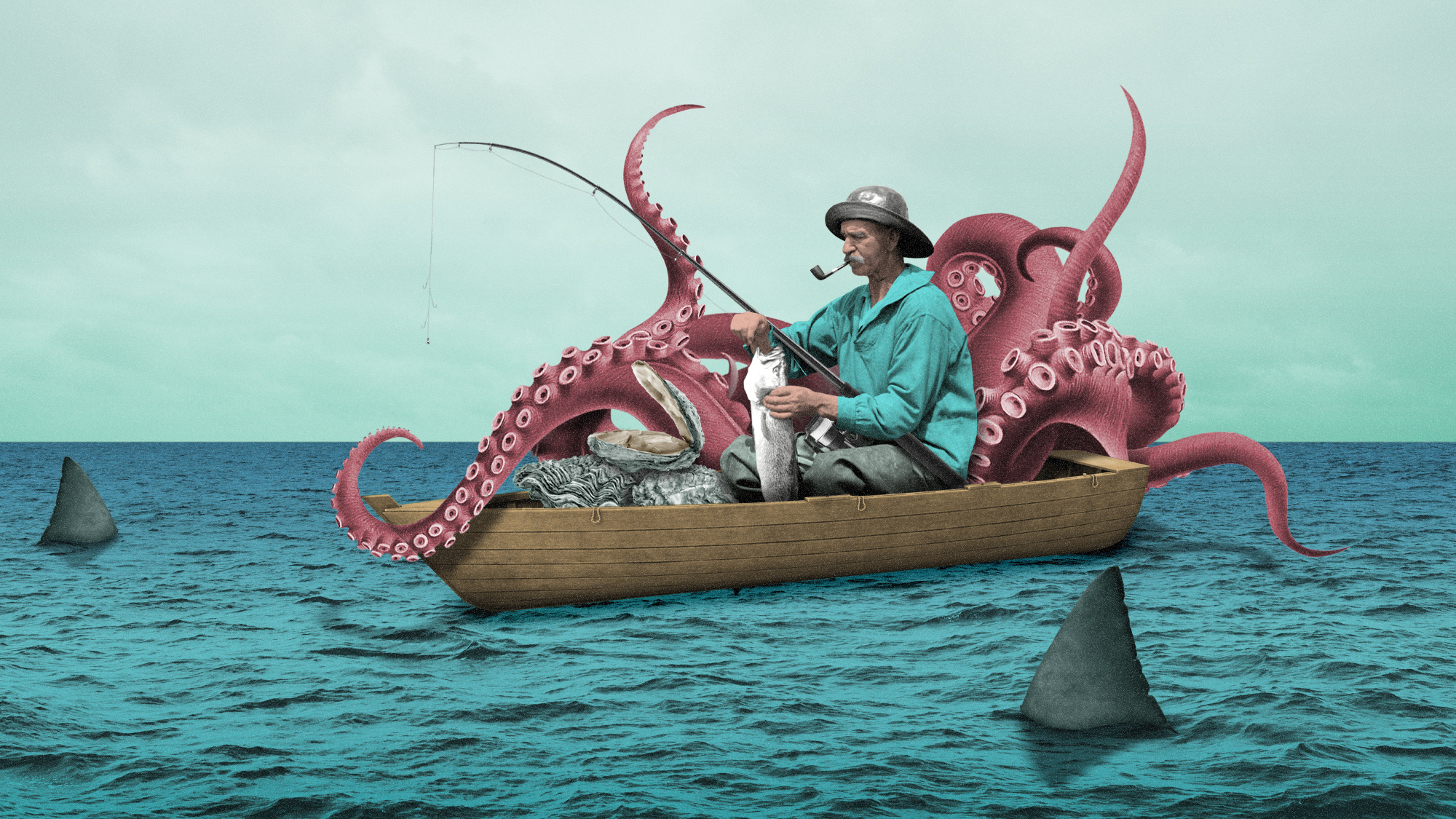Octopus, Orcas and Oysters: how the UK's marine environment is changing
Warming seas are causing drastic changes to underwater habitats and the marine life within them

A free daily email with the biggest news stories of the day – and the best features from TheWeek.com
You are now subscribed
Your newsletter sign-up was successful
The UK's marine life could change substantially over the coming years as sea temperatures continue to rise. Various species of shark, octopus and tuna, normally found in warmer climes like the Mediterranean, could all start to appear in the waters around the country in greater numbers.
But, such a dramatic change could have negative knock-on effects on the UK's ecosystem, with some native species likely to struggle to adapt.
What kinds of marine life could appear?
There have already been recordings of unfamiliar types of sharks, octopuses, jellyfish and rays recently appearing in UK waters as sea temperatures rise and provide hospitable living conditions and access to prey.
The Week
Escape your echo chamber. Get the facts behind the news, plus analysis from multiple perspectives.

Sign up for The Week's Free Newsletters
From our morning news briefing to a weekly Good News Newsletter, get the best of The Week delivered directly to your inbox.
From our morning news briefing to a weekly Good News Newsletter, get the best of The Week delivered directly to your inbox.
These species could all boom as conditions change, as could some more static marine life, such as native oysters, according to researchers at the Centre for Environment, Fisheries and Aquaculture Science (Cefas), who analysed how 19 threatened marine species could respond to climate change. Among the "biggest winners" are "native oysters, basking sharks, spurdog sharks, and thornbacks", said the BBC.
But the researchers also identified species that could struggle to adapt in the changing seas, mostly static creatures, including the small seafloor-dwelling invertebrates, sea pens and the ocean quahog, a type of clam that can live up to 500 years.
How much is the environment changing?
Sea temperatures have been hotter than usual in recent weeks due to the extended surge in heat in the UK during spring. Some areas have been recorded as much as 4 degrees warmer this year, with potential negative implications for marine life, the longer it goes on.
This may be a temporary heatwave that we're currently experiencing, but the greater concern is that climate change is causing marine heatwaves to happen more often and potentially become more intense.
A free daily email with the biggest news stories of the day – and the best features from TheWeek.com
What are the possible consequences?
There is no conclusive evidence as to how sustained higher temperatures could affect marine life, but it could disturb current breeding patterns and bring other species like jellyfish en masse into UK waters, as well as harmful algae.
It could signal an immediate gain for British fishermen as more fish and other species like octopus arrive in the warmer seas, but that could also bring with it more predators. It's not even "unreasonable to think" that great white sharks could start to pop up off UK shores, with "plenty of potential prey" in seals and sea lions and "suitable water temperatures", said Discover Wildlife.
Changing marine life could then lead to more Marine Protected Areas (MPAs) being implemented by the government, something that has caused consternation among commercial fishermen, worried it would prevent them from using the controversial bottom trawling method to catch fish.
There will also likely be a closer look at how humans interact with the changing wildlife. Earlier this month, Police Scotland appealed for information after a speedboat "deliberately disturbed" a pod of orcas on the Moray Coast. Orcas are not uncommon in the summer months around the coast of Scotland, but they have been "spotted earlier and later" than usual in recent years, said The Press and Journal.
What action is being taken?
The Labour government has already proposed to expand a ban on bottom trawling, which involves dragging large nets along the seabed, across thousands of miles of 41 MPAs. The ban is subject to a 12-week consultation, but conservationists are concerned that trawling is harmful to rare marine animals and their habitats. It can also release huge amounts of carbon dioxide from the seabed each year, potentially accelerating climate change.
Research is also taking place at the University of Plymouth and Exeter to try and counter drastic changes to marine life through climate change. Scientists in Devon and Cornwall are examining whether huge numbers of mussels can help restore habitats, acting as natural biofilters for harmful algae, for example. Other research is also looking at whether certain microscopic marine fungi can have a wider effect on climate change on land and sea, being able to absorb large portions of carbon dioxide from the atmosphere and slow down climate change.
Richard Windsor is a freelance writer for The Week Digital. He began his journalism career writing about politics and sport while studying at the University of Southampton. He then worked across various football publications before specialising in cycling for almost nine years, covering major races including the Tour de France and interviewing some of the sport’s top riders. He led Cycling Weekly’s digital platforms as editor for seven of those years, helping to transform the publication into the UK’s largest cycling website. He now works as a freelance writer, editor and consultant.
-
 Bondi, Democrats clash over Epstein in hearing
Bondi, Democrats clash over Epstein in hearingSpeed Read Attorney General Pam Bondi ignored survivors of convicted sex offender Jeffrey Epstein and demanded that Democrats apologize to Trump
-
 Are Big Tech firms the new tobacco companies?
Are Big Tech firms the new tobacco companies?Today’s Big Question Trial will determine if Meta, YouTube designed addictive products
-
 El Paso airspace closure tied to FAA-Pentagon standoff
El Paso airspace closure tied to FAA-Pentagon standoffSpeed Read The closure in the Texas border city stemmed from disagreements between the Federal Aviation Administration and Pentagon officials over drone-related tests
-
 The plan to wall off the ‘Doomsday’ glacier
The plan to wall off the ‘Doomsday’ glacierUnder the Radar Massive barrier could ‘slow the rate of ice loss’ from Thwaites Glacier, whose total collapse would have devastating consequences
-
 Can the UK take any more rain?
Can the UK take any more rain?Today’s Big Question An Atlantic jet stream is ‘stuck’ over British skies, leading to ‘biblical’ downpours and more than 40 consecutive days of rain in some areas
-
 As temperatures rise, US incomes fall
As temperatures rise, US incomes fallUnder the radar Elevated temperatures are capable of affecting the entire economy
-
 The world is entering an ‘era of water bankruptcy’
The world is entering an ‘era of water bankruptcy’The explainer Water might soon be more valuable than gold
-
 Climate change could lead to a reptile ‘sexpocalypse’
Climate change could lead to a reptile ‘sexpocalypse’Under the radar The gender gap has hit the animal kingdom
-
 The former largest iceberg is turning blue. It’s a bad sign.
The former largest iceberg is turning blue. It’s a bad sign.Under the radar It is quickly melting away
-
 Why the Middle East is obsessed with falcons
Why the Middle East is obsessed with falconsUnder the Radar Popularity of the birds of prey has been ‘soaring’ despite doubts over the legality of sourcing and concerns for animal welfare
-
 How drones detected a deadly threat to Arctic whales
How drones detected a deadly threat to Arctic whalesUnder the radar Monitoring the sea in the air